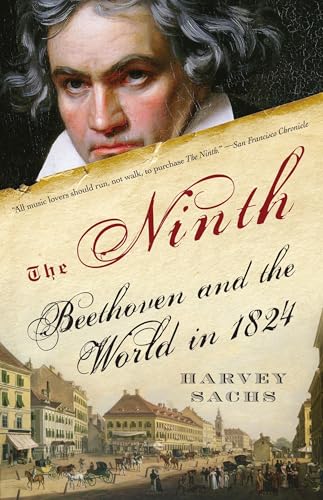Harvey Sachs "The Ninth: Beethoven and the World in 1824" (Random House)

The premier of Beethoven’s Ninth Symphony in 1824 was financed by Beethoven himself. His net income, sorely needed, from the concert, would have just about covered rent for a month and yet the impact of this event was colossal when looking back with a twenty-first-century perspective. Harvey Sachs has written a reflective history along with his opinion of the world that surrounded Beethoven during the year when The Ninth Symphony premiered in Vienna. The artists Byron, Pushkin, Delacroix, Heine and Stendahl who lived during this Romantic Age, were Beethoven’s contemporary creative companions and they shared his world stage. Sachs links them together in his book with what he says was their “quest for freedom.” Sachs compares their work and their philosophies of the world, the world as Beethoven knew when The Ninth Symphony was heard for the first time.
As Beethoven would have wanted, this book is for all to appreciate. A meritorious and philosophically meaningful book. It reads like you have opened a time capsule that looks upon the early 19th-century cultural stage.

The premier of Beethoven’s Ninth Symphony in 1824 was financed by Beethoven himself. His net income, sorely needed, from the concert, would have just about covered rent for a month and yet the impact of this event was colossal when looking back with a twenty-first-century perspective. Harvey Sachs has written a reflective history along with his opinion of the world that surrounded Beethoven during the year when The Ninth Symphony premiered in Vienna. The artists Byron, Pushkin, Delacroix, Heine and Stendahl who lived during this Romantic Age, were Beethoven’s contemporary creative companions and they shared his world stage. Sachs links them together in his book with what he says was their “quest for freedom.” Sachs compares their work and their philosophies of the world, the world as Beethoven knew when The Ninth Symphony was heard for the first time.
As Beethoven would have wanted, this book is for all to appreciate. A meritorious and philosophically meaningful book. It reads like you have opened a time capsule that looks upon the early 19th-century cultural stage.
